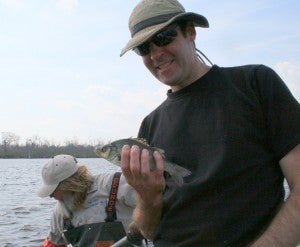Amanda Leland and I were guests on Moir’s Environmental Dialogues the other day. The host, Rob Moir is the president and executive director of the Ocean River Institute. Rob has had an illustrious career as an educator, scientists and environmental activist and wanted to hear from EDF about catch shares. This is an important time for fishing as a new catch shares policy gets underway.
EDFish
Statement from EDF on Fisherman Protest off Martha’s Vineyard
A small fleet of fishermen is expected to stage a protest today off the coast of Martha’s Vineyard directed at President Obama over a recent change in regulations for commercial groundfish fishermen. The following statement is from Sally McGee, the New England Policy Director for EDF and a member of the New England Fishery Management Council, which recently voted 16-0 in favor of the new management approach for the groundfish fishery (Motion 21a from NEFMC meeting held in Portland, ME, June 25, 2009).
“Today’s demonstration comes at a tough time for fishermen in New England. Many are anxious over a change in fishing policy that is coming after decades of declining fish stocks and complicated rules that have squeezed scores of fishermen out of business. Once we are through this transition process, however, the decline of the groundfish fishery will have been halted, rules will be simpler, and fishermen will be making money once again.
“The new rules – called “catch shares” or “sectors” – will give groundfish fishermen a dedicated share of the overall catch. Instead of being forced to fish under ever-increasingly restrictive rules, catch shares will give fishermen in New England flexibility to choose how they meet the scientifically-set catch limit. Catch shares have a history of success in Alaska and the Gulf of Mexico, as well as two groundfish sectors already on-the-water in New England. Under catch shares, fish stocks recover and fishermen once again become profitable.
“The change to catch shares is coming after a lengthy and thorough public process. In fact, the final decision was delayed a full year to allow more time for additional public input. The three-year process showed broad and growing support for catch shares in New England.
“The problems with the New England groundfish fishery are deep, severe and centuries in the making. Catch shares will not turn this situation around overnight. The alternatives are far worse however. Without catch shares the fish stocks and the health of the ocean will only decline further. Catch shares offers hope and a track record of success. ”
New Oyster Reef Yields Good Results in Chesapeake
Here’s something you don’t hear about every day: good news about the Chesapeake Bay. The Washington Post is reporting that an artificial reef in a tributary is teeming with new life. The reef is nothing more complex than a large pile of shells. Historically reefs like that were so numerous they were a hazard for ships. So many oysters lived in the Chesapeake that they filtered all the water in the bay every few days.
The demise of the Chesapeake oyster came around the turn of the last century through a manic and violent harvest that reduced the population to just one percent of historic abundance in less than a century. As many as 15 million oysters were harvested annually in the late 1800’s, compared to 100,000 or less today.
Scores of people died in the mad pursuit of oysters. Maryland was forced to establish the Oyster Police to protect its oystermen against their counterparts from Virginia. Violent conflicts between watermen from the two states became so common that this era is now known as the Oyster Wars.
New York Times Editorial on Catch Shares
We woke this morning to a fantastic editorial on catch shares. It says that “fisheries almost everywhere could use a change in direction. A well-managed American system would be an example for the world. ” EDF is working to make catch shares the management and performance standard for America’s fisheries and this editorial indicates that there is now significant momemtum in that direction.
EDF Celebrates World Oceans Day
A lot of people are thinking about the oceans today thanks to an official designation by the United Nations of World Oceans Day, so it’s a good time to step back and ponder why the oceans are so important. They cover 70 percent of the planet. One out of six people in the world depend on seafood for their protein and 200 million people rely on fishing alone for their income.
Of course much of what we hear about the oceans these day is bad. They’re being emptied of seafood, 90% of large fish like tuna and swordfish have been removed and fishing is fundamentally altering ocean ecosystems. But thankfully, there is some really good news too.
Years ago, EDF chose to focus its Oceans program on catch shares, a proven, innovative management system for fisheries that is proving itself around the world. A raft of new catch share initiatives are moving across the country and the prospects for broad change are growing. That’s certainly something to celebrate – for fishermen, consumers and the oceans.
Costello and Gaines Continue to Make the Case for Catch Shares
Professors Christopher Costello and Steven Gaines have recently sent ripples throughout the fishing world. Last year, they published a groundbreaking study in the journal Science, showing that fisheries under catch shares management dramatically outperform fisheries under traditional management in terms of preventing overfishing. Their most recent commentary discusses how catch shares can be customized to meet specific goals of a fishery and to address particular concerns. It also looks at how catch shares might be made more effective by, for instance, combining them with protected areas.










